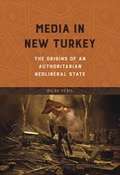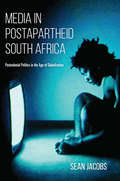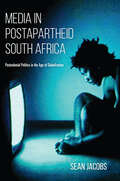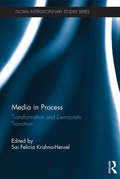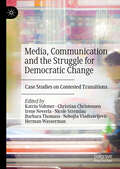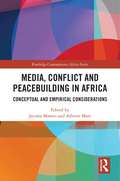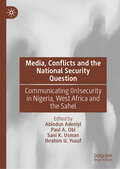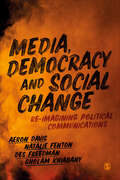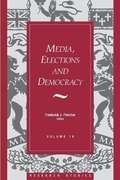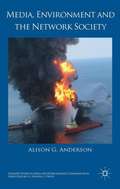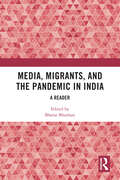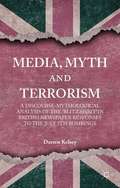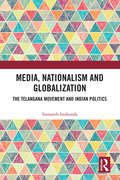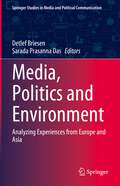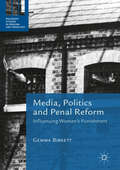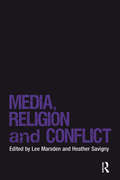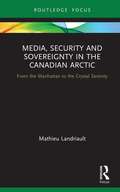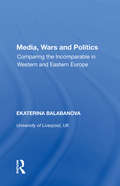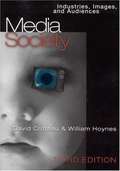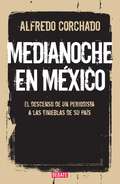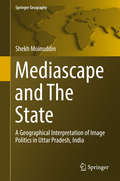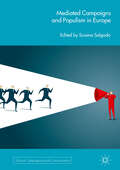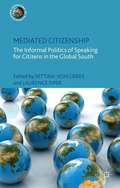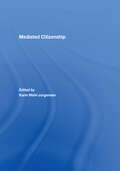- Table View
- List View
Media in New Turkey: The Origins of an Authoritarian Neoliberal State (The Geopolitics of Information)
by Bilge YesilIn Media in New Turkey, Bilge Yesil unlocks the complexities surrounding and penetrating today's Turkish media. Yesil focuses on a convergence of global and domestic forces that range from the 1980 military coup to globalization's inroads and the recent resurgence of political Islam. Her analysis foregrounds how these and other forces become intertwined, and she uses Turkey's media to unpack the ever-more-complex relationships. Yesil confronts essential questions regarding: the role of the state and military in building the structures that shaped Turkey's media system; media adaptations to ever-shifting contours of political and economic power; how the far-flung economic interests of media conglomerates leave them vulnerable to state pressure; and the ways Turkey's politicized judiciary criminalizes certain speech. Drawing on local knowledge and a wealth of Turkish sources, Yesil provides an engrossing look at the fault lines carved by authoritarianism, tradition, neoliberal reform, and globalization within Turkey's increasingly far-reaching media.
Media in Postapartheid South Africa: Postcolonial Politics in the Age of Globalization
by Sean JacobsIn Media in Postapartheid South Africa, author Sean Jacobs turns to media politics and the consumption of media as a way to understand recent political developments in South Africa and their relations with the African continent and the world. Jacobs looks at how mass media define the physical and human geography of the society and what it means for comprehending changing notions of citizenship in postapartheid South Africa. Jacobs claims that the media have unprecedented control over the distribution of public goods, rights claims, and South Africa's integration into the global political economy in ways that were impossible under the state-controlled media that dominated the apartheid years. Jacobs takes a probing look at television commercials and the representation of South Africans, reality television shows and South African continental expansion, soap operas and postapartheid identity politics, and the internet as a space for reassertions and reconfigurations of identity. As South Africa becomes more integrated into the global economy, Jacobs argues that local media have more weight in shaping how consumers view these products in unexpected and consequential ways.
Media in Postapartheid South Africa: Postcolonial Politics in the Age of Globalization
by Sean JacobsA study of mass media in twenty-first-century South Africa offering “revelations about the nature of citizenship and public engagement in our media saturated age” (Daniel R. Magaziner, author of The Law and the Prophets: Black Consciousness in South Africa , 1968–1977).In Media in Postapartheid South Africa, Sean Jacobs turns to media politics and the consumption of media as a way to understand recent political developments in South Africa and their relations with the African continent and the world.Jacobs looks at how mass media define the physical and human geography of the society and what it means for comprehending changing notions of citizenship in postapartheid South Africa. Jacobs claims that the media have unprecedented control over the distribution of public goods, rights claims, and South Africa’s integration into the global political economy in ways that were impossible under the state-controlled media that dominated the apartheid years. Jacobs takes a probing look at television commercials and the representation of South Africans, reality television shows and South African continental expansion, soap operas and postapartheid identity politics, and the internet as a space for reassertions and reconfigurations of identity. As South Africa becomes more integrated into the global economy, Jacobs argues that local media have more weight in shaping how consumers view these products in unexpected and consequential ways.
Media in Process: Transformation and Democratic Transition (Global Interdisciplinary Studies Series)
by Sai Felicia Krishna-HenselThe post-communist development of media systems has been uneven in the countries of the region. Television and newspapers, together with the emergence of social media, have had great influence on the political debate in various countries. Ownership of the media has been a factor in many instances. The integration of traditionally isolated Central/Eastern Europe into larger, worldwide trends has fundamentally changed the way we look at the media in this region. This volume proposes to address the transition of the media and communication industries in the contemporary period. The contributions discuss, among other things, the obstacles that still remain for the media to play an effective watchdog role in the new democracies, and whether the advent of the Internet and social media has helped or hindered the transformation to a powerful, independent media. The discussion further examines whether advertising agencies have targeted post-communist citizens differently than those in Western European countries and if the media markets in the post-communist region are fundamentally different than in Western Europe and North America. A second focus of the volume is the media coverage of social issues like domestic violence, which is intended to draw attention to these issues and influence policy in a more aware and open society. This establishes the trend of post-communist media following the example of western media practice. The implications of the Central European media transformation for the newly transforming media markets in the post-Soviet space suggest a new phase in the development of the medium. The impact of global influences on regional expression is an important aspect of the political and social changes that are underway. This volume makes an important interdisciplinary contribution in examining the development of the media.
Media, Communication and the Struggle for Democratic Change: Case Studies on Contested Transitions
by Katrin Voltmer Christian Christensen Herman Wasserman Nicole Stremlau Barbara Thomass Irene Neverla Nebojša VladisavljevićThis book investigates the role of media and communication in processes of democratization in different political and cultural contexts. Struggles for democratic change are periods of intense contest over the transformation of citizenship and the reconfiguration of political power. These democratization conflicts are played out within an increasingly complex media ecology where traditional modes of communication merge with new digital networks, thus bringing about multiple platforms for journalists and political actors to promote and contest competing definitions of reality. The volume draws on extensive case study research in South Africa, Kenya, Egypt and Serbia to highlight the ambivalent role of the media as force for democratic change, citizen empowerment, and accountability, as well as driver of polarization, radicalization and manipulation.
Media, Conflict and Peacebuilding in Africa: Conceptual and Empirical Considerations (Routledge Contemporary Africa)
by Jacinta MaweuThis book explores the role and place of popular, traditional and digital media platforms in the mediatization, representation and performance of various conflicts and peacebuilding interventions in the African context. The role of the media in conflict is often depicted as either ‘good’ (as symbolized by peace journalism) and ‘bad’ (as exemplified by war journalism), but this book moves beyond this binary to highlight the ‘in-between’ role that the media often plays in times of conflict. The volume does not only focus on the relationship between mass media, conflict and peacebuilding processes but it broadens its scope by critically analysing the dynamic and emergent roles of popular and digital media platforms in a continent where the semi-literate and oral communities still rely heavily on popular communication platforms to get news and information. Whilst social media platforms have been hailed for their assumed democratic and digital dividends, this book does not only focus on these positive aspects but also shines a light on dark forms of participation which are fuelling racial, gender, ethnic, political and religious conflicts in highly polarized and stratified societies. Highlighting the many ways in which traditional, digital and popular media can be used to both escalate conflicts and promote peacebuilding, this volume will be a useful resource for students, researchers and civil society groups interested in peace and conflict studies, journalism and media studies in different contexts within Africa.
Media, Conflicts and the National Security Question: Communicating (In)security in Nigeria, West Africa and the Sahel
by Abiodun Adeniyi Paul A. Obi Sani K. Usman Ibrahim U. YusufThis book explores how the media, and journalism in a cross-disciplinary sense, has treated conflicts in Nigeria, West Africa and the Sahel. Contributors connect theoretical foundations with practical experiences in the study of media, conflicts and national security, seeking to unravel the mediated and communication logic(s) in news coverage and analyse the media's role in pre-conflict, in-conflict and post-conflict discourses. The work maps out the impact of mediated narratives on security, risk, terrorism, banditry and general society, relying on local, on-the-spot and ontological cultural experiences in Africa, especially Nigeria, Ghana, Sierra Leone and other parts of West Africa.
Media, Democracy and Social Change: Re-imagining Political Communications
by Des Freedman Aeron Davis Natalie Fenton Gholam KhiabanyWhen we are told so regularly that we live in a ‘post truth’ age and are surrounded by ‘fake news’, it can be tempting to think of politics as primarily mediated. Discussion and analysis of public affairs is preoccupied with the power and reach of platforms or the passion and rage of social media exchanges. As important as these issues may be, a focus on the communicative risks downgrading the political. Media, Democracy and Social Change puts politics back into political communications. It shows how within a digital media ecology, the wider context of neoliberal capitalism remains essential for understanding what political communications is, and can hope to be. Tackling broad themes of structural inequality, technological change, political realignment and social transformation, the book explores political communications as it relates to debates around the state, infrastructures, elites, populism, political parties, activism, the legacies of colonialism, and more. It is both an expert introduction to the field of political communications, and a critical intervention to help re-imagine what a democratic politics might mean in a digital age. It will be essential reading for students, researchers and activists. Aeron Davis, Natalie Fenton, Des Freedman and Gholam Khiabany all work at the Department of Media and Communication at Goldsmiths, University of London, where they teach together on the MA in Political Communications.
Media, Democracy and Social Change: Re-imagining Political Communications
by Des Freedman Aeron Davis Natalie Fenton Gholam KhiabanyWhen we are told so regularly that we live in a ‘post truth’ age and are surrounded by ‘fake news’, it can be tempting to think of politics as primarily mediated. Discussion and analysis of public affairs is preoccupied with the power and reach of platforms or the passion and rage of social media exchanges. As important as these issues may be, a focus on the communicative risks downgrading the political. Media, Democracy and Social Change puts politics back into political communications. It shows how within a digital media ecology, the wider context of neoliberal capitalism remains essential for understanding what political communications is, and can hope to be. Tackling broad themes of structural inequality, technological change, political realignment and social transformation, the book explores political communications as it relates to debates around the state, infrastructures, elites, populism, political parties, activism, the legacies of colonialism, and more. It is both an expert introduction to the field of political communications, and a critical intervention to help re-imagine what a democratic politics might mean in a digital age. It will be essential reading for students, researchers and activists. Aeron Davis, Natalie Fenton, Des Freedman and Gholam Khiabany all work at the Department of Media and Communication at Goldsmiths, University of London, where they teach together on the MA in Political Communications.
Media, Elections, And Democracy: Royal Commission on Electoral Reform
by Frederick J. FletcherMedia, Elections and Democracy examines campaign communication in selected industrial democracies. Klaus Schoenbach, Karen Siune, Doris Graber and a host of authors around the world contribute critical overviews of the systems in their countries. The studies deal with a wide range of issues in modern communication, including the principles and practices of news and public affairs coverage and the impact of new technologies.
Media, Environment and the Network Society
by Alison G. AndersonThe news media has become a key arena for staging environmental conflicts. Through a range of illuminating examples ranging from climate change to oil spills, Media, Environment and the Network Society provides a timely and far-reaching analysis of the media politics of contemporary environmental debates.
Media, Migrants and the Pandemic in India: A Reader
by Bharat BhushanThe national lockdown to contain the COVID-19 pandemic in India resulted in the loss of work and displacement of thousands of urban migrant workers. This book records the arduous journey home for many of these workers and analyses the grave effects the pandemic has had on jobs, livelihoods, and the health of urban migrant workers. A rich compilation of deep analytical articles by journalists, academics, lawyers, and social activists, this book explores various facets of the crisis as it unfolded. It examines the welfare policies of state and central governments and discusses the role of the judiciary and the public policy response to the unemployment, health risks, and mass migration of workers. It also offers readers a better understanding of the complexities of the migrant crisis, how it unfolded, and how it was addressed by the media. This timely and prescient book will be of great interest to the general reader as well as researchers and students of media studies, journalism, sociology, law, public policy, labour and economics, welfare economics, gender studies, and development studies.
Media, Myth and Terrorism
by Darren KelseyMedia, Myth and Terrorism provides a rigorous case study of Blitz mythology in British newspaper responses to the July 7th bombings. Considering how the press, politicians and members of the public were caught up in popular accounts of Britain's past, Kelsey explores the ideological battleground that took place in the weeks following the bombings as the myth of the Blitz was invoked. By providing conceptual discussions of myth, discourse, and ideology, Kelsey proposes a discourse-mythological framework designed for analysing discursive constructions of mythology. In doing so, this research considers multiple recontextualisations of the Blitz myth when popular memories of 1940 recurred in 2005. Kelsey encourages readers to understand the politics of remembering by showing how popular yet inaccurate stories from the past have a significant impact on our perceptions of the present. Heroism, trauma, economics, Royalty, rituals, human rights, foreign policy, immigration and multiculturalism are just some of the topics covered across a vast landscape of stories embracing a myth from the past in order to understand the present.
Media, Nationalism and Globalization: The Telangana Movement and Indian Politics
by Sumanth InukondaThis book explores the meanings of nationalism in a post-globalization, postcolonial context. It provides an in-depth understanding of the relationship between marginalized groups, media and politics by a focused study of the Telangana movement in India. Events like the Arab Spring, unrest in Myanmar and Ukraine, and the Brexit, Kurdish and Catalan referendums have proved how catalytic the changing media environment has been in reshaping the nature of resistance and social movements. Based on the author’s ethnographic research, this book examines how marginalized groups engage with the media and their community to participate in political processes. Analyzing public meetings, folk performances, pamphlets and media reports of the Telangana movement, the author reflects on the cultural notions of nationalism and the politics of state formation in the post-colonial context. This volume also evaluates the role of students and intellectuals in contemporary social movements and in uniting the discontents of globalization. Highlighting intersections of performativity, geography and justice, this book examines changing articulations of identity and everyday forms of resistance. It will be useful for students and research scholars interested in media and communication, cultural studies, political sciences, ethnic and minority studies and sociocultural movements in India.
Media, Politics and Environment: Analyzing Experiences from Europe and Asia (Springer Studies in Media and Political Communication)
by Detlef Briesen Sarada Prasanna DasEnvironmental protection has not equally established itself as a permanent fixture in the political systems of all countries: to date, governments and entire societies have responded to environmental challenges in a variety of ways, and concrete environmental policy is still a highly national matter. Moreover, the perception of environmental problems varies considerably on a global scale. The reasons normally cited for these differences largely stem from the environmental policy debates themselves, e.g. poverty, ignorance, capital interests, etc. In contrast, this book shows that concrete environmental policy emerges from a complex interplay of mass media and political conflicts: first, the mass media provide the framework for national environmental policy through agenda-setting, framing and scandalization; second, the mass media thereby change values in the political and social discourse, e.g. by altering the perception of global commons and expanding the possibilities of interest articulation; and third, this can lead to political decision-making processes in which legal and other measures for environmental protection are enforced. The book systematically compares industrialized countries such as Germany and Japan with several rapidly emerging countries in South and Southeast Asia.
Media, Politics and Penal Reform
by Gemma BirkettThis book examines the nature of relations between penal reform campaigners, journalists and policymakers at the crime-media nexus. With a particular focus on women's penal policy, Birkett uncovers how reform strategies have augmented and developed under changing governments and the news media spotlight. While penal reformers have traditionally relied on the language of humanitarianism to influence the direction of policy, there remains an array of political and cultural sticking points. With a policy-focused orientation, this study provides a number of pragmatic and practical tips for those wishing to think more strategically about their ability to influence politicians, the media and the public. With unprecedented access to over thirty policy elites working around Westminster and Whitehall during the development of the Corston agenda (and beyond), this engaging and timely work exposes the triumphs and tribulations of such actors for the very first time.
Media, Religion and Conflict (Religion and International Security)
by Heather SavignyInternational relations as a discipline has largely ignored the role of religion in shaping international events. The growth of Islamist militancy, the increasing influence of the Christian Right on US foreign policy and George Bush's war on terror changed this for good. Now more than ever we need to analyze this change and consider how religion and the way it is represented affects international politics. Lee Marsden and Heather Savigny uniquely bring together some of the leading figures in the fields of politics and media, international relations and security, and international relations and religion, including freelance journalist and newspaper columnist Nick Cohen, the international authority on politics and religion Professor Jeffrey Haynes, and Professor Justin Lewis who has a number of BBC commissions under his belt. The volume offers a series of case studies reflecting on how the media covers religion as conflict within and between states. It challenges readers to critically examine how media reportage and commentary influences perceptions and responses to religion and security.
Media, Security and Sovereignty in the Canadian Arctic: From the Manhattan to the Crystal Serenity
by Mathieu LandriaultThis book documents how the Arctic region has been represented in the media: exploring how the media has framed the Arctic and whether this has an impact on governmental decision-making and public preferences. The Arctic region faces profound transformations, due to global warming, spurring intense debates about economic growth, environmental protection, and socio-cultural development. At the same time, most of humanity will never come face-to-face with the realities of the region: the media represents our only opportunity to learn about what this evolving region stands for. Recognizing that media coverage will tend to focus on specific events and relay specific messages, this book scrutinizes the nature of these messages to figure out how the Arctic region is presented by different media outlets. Studying different types of media, Landriault conducts an analysis of 628 newspaper articles, 110 televised reports, 9 magazine articles, and 404 tweets to provide the first systematic and rigorous study of Arctic media representations. This book will interest scholars, practitioners, and students in Arctic studies, critical geography, political science, and communication studies.
Media, Wars and Politics: Comparing the Incomparable in Western and Eastern Europe
by Ekaterina BalabanovaThe interaction between media and foreign policy is a critical dimension of the so-called age of 'new military humanitarianism'. The media is now more effective in gathering and distributing information all over the world and media coverage of humanitarian wars allows for information and images to reach a wide audience with great immediacy and realism. For policy making, the 24/7 news cycle means high levels of exposure to fast-breaking international stories receiving global attention and producing a powerful 'do something!' effect. This topical book widens the debate beyond US media and policy making by considering the case of Western and Eastern European media and policy processes. It tests the wider application of existing theoretical approaches and provides useful comparisons, allowing the reader to draw conclusions on the media-policy relationship. It is an excellent resource for all those interested in political communication, European politics and media studies.
Media/Society: Industries, Images, and Audiences
by David Croteau William HoynesPresenting the new edition of their undergraduate-level textbook, Croteau (sociology and anthropology, Virginia Commonwealth U.) and Hoynes (sociology, Vassar College) discuss the social components of the mass media and highlight the tension between constraint and action. Their analysis is based on a social model that sees media as being part of multidimensional process of complex interaction between audiences, technology, medial message, and media industry, all operating within the wider context of the social world. Annotation c. Book News, Inc., Portland, OR (booknews.com)
Medianoche en México: El descenso de un periodista a las tinieblas de un país en guerra
by Alfredo CorchadoUn periodista sigue la pista de diversos cárteles de la droga en México, hasta que su propia vida es puesta en predicamento. Es medianoche en México, 2007. Alfredo Corchado recibe una llamada telefónica de su fuente principal para informarle que hay un plan para asesinarlo por parte de un poderoso capo. Pronto averigua que lo quieren matar porque uno de sus artículos en el Dallas Morning News afectó los sobornos que los narcotraficantes entregan a policías, militares y funcionarios del gobierno mexicano. Así comienza el viaje en espiral de un hombre que busca descifrar la compleja situación del país mientras lucha por salvar su vida. A pesar de recorrer un camino de múltiples encrucijadas, desigualdad y violencia extrema, Corchado, "infectado con la enfermedad incurable del periodismo", no se resigna a abandonar la esperanza en tiempos turbulentos. Ahora, el líder del brutal cártel que lo perseguía, el Z-40, está detenido, pero la historia no haterminado de escribirse. "Este libro habla sobre las sangrientas fronteras que dividen los dos países de Alfredo Corchado -México y Estados Unidos- y que han regido su propia vida. Con el telón de fondo de la terrible y violenta guerra contra las drogas que ha convertido a México en una tierra de sepulcros, Corchado comparte su propia historia y la de su familia de manera conmovedora, honesta y aguda." -JON LEE ANDERSON, autor de Che Guevara, una vida revolucionaria "Un sutil y conmovedor testimonio que servirá a cualquiera que desee entender a México desde sus profundidades y cómo es afectado -legal e ilegalmente- por Estados Unidos." -JOHN WOMACK JR., autor de Rebelión en Chiapas "Alfredo Corchado es el tipo de reportero y escritor que nos hace recuperar la fe en el periodismo." -TRACY KIDDER, Premio Pulitzer, autor de La fuerza de lo que queda
Mediascape and The State
by Shekh MoinuddinThis book investigates image politics during elections and how the political discourse is reflected during the Uttar Pradesh assembly elections in 2012 by the media and the state. It reveals new dimensions of media geography in India and makes image construction and interpretation easy to comprehend. This interdisciplinary approach is located at the interface of geography with social, political, cultural, and media sciences. The book draws a geographical interpretation of politics to reveal the role of both media and the state to shape the political discourse with special focus on the privileged position of the "heartland" Uttar Pradesh in Indian politics. It studies the "mediascape" by highlighting application of media in both public and private spheres and discussing the importance of both old and new media, e. g. , print, radio, TV, social media. Several crucial aspects are discussed and answered. How do media and politicians construct politics around the issue of minorities? How do media communalize issues during the election campaign? How can local issues gain national importance and shape national politics? This book appeals to scientists but also to graduates and postgraduates that want to understand the way image politics are performed.
Mediated Campaigns and Populism in Europe (Political Campaigning and Communication)
by Susana SalgadoThis book analyses the coverage of elections that occurred between September 2015 and February 2016 in six European countries (Greece, Portugal, Poland, Croatia, Spain and Ireland). The sample examined includes all news stories published during the official electoral campaign in different types of media outlets: three newspapers per country covering centre-left and centre-right wing political leaning, as well as reference and tabloid papers; three main television news broadcasts covering commercial/private and public broadcast television channels; and three papers that are published only online, taking into account their levels of audience and importance within each national media and political system. The book also examines different connections to the EU and to the Euro Crisis. Questions such as the following guide the overall analysis: In what ways is news election coverage similar and different in these countries? Which issues are mostly covered by the news media and how? Are there patterns of election news coverage in these six European countries? This book is indispensable reading for researchers and students in the field of the media coverage of election campaigns, political communication and populism.Chapters 4 and 8 are available open access under a Creative Commons Attribution 4.0 International License via link.springer.com.
Mediated Citizenship
by Bettina Von Lieres Laurence PiperDrawing on case studies from the global South, this book explores the politics of mediated citizenship in which citizens are represented to the state through third party intermediaries. The studies show that mediation is both widely practiced and multi-directional and that it has an important role to play in deepening democracy in the global South.
Mediated Citizenship
by Karin Wahl-JorgensenPreviously published as a special issue of Social Semiotics, this book grapples with such questions as: What does it mean to be a citizen in contemporary societies? What role do mass media play in the making of citizenship? Drawing on ground-breaking work from scholars around the world known for their contributions to the study of media and politics, this volume covers a range of practices of mediated citizenship, with chapters studying the mourning after the deaths of Pim Fortuyn and Theo van Gogh in the Netherlands and notions of authenticity in letters written to British Conservative politician Boris Johnson. The authors explore discourses of nationalism in the English and Scottish Press, and examine struggles over definitions of the public in Australian public service broadcasting and the US Medicare debate. Emerging possibilities for mediated citizenship are assessed in three studies of online activism and participation in the US and China. The book builds on conventional understandings of citizenship and the public sphere, calling attention to the need for understanding affective attachments to politics. Finally, it demonstrates that we cannot fully understand citizenship without looking at the concrete workings of power in and through mediated discourse.
